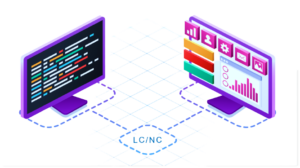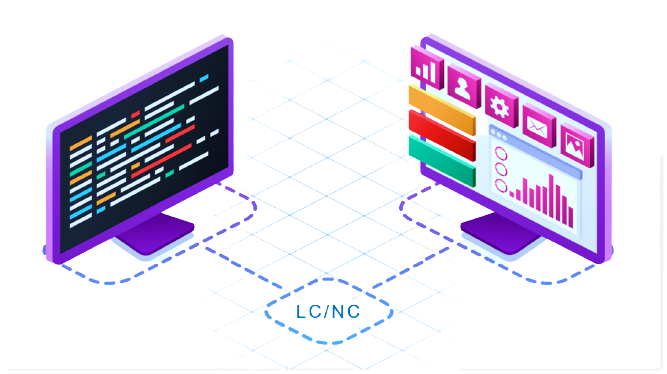No-code/low-code platforms are software tools that allow individuals to build websites and applications without the need for coding skills. These platforms typically use drag-and-drop interfaces and pre-built templates to make it easy for non-technical users to create complex websites and applications.
The world of web development is rapidly evolving, and new technologies are emerging to simplify the process of building websites and applications. No-code/low-code platforms are one such technology that has gained a lot of attention in recent years. These platforms promise to make web development accessible to everyone, regardless of their technical skill level.
In this blog post, we will explore the rise of no-code/low-code platforms and examine whether they are the future of web development.
What are No-Code/Low-Code Platforms?
No-code/low-code platforms are software tools that allow individuals to build websites and applications without the need for coding skills. These platforms typically use drag-and-drop interfaces and pre-built templates to make it easy for non-technical users to create complex websites and applications. It can be used for a variety of purposes, including building e-commerce websites, mobile applications, and even chatbots.

The Advantages of No-Code/Low-Code Platforms
-
Increased Accessibility
One of the most significant advantages of no-code/low-code platforms is that they make web development accessible to everyone. With these platforms, individuals without coding skills can build their websites and applications, reducing the need for expensive development teams. This can save businesses a lot of time and money, allowing them to focus on other critical aspects of their operations.
-
Faster Development Times
No-code/low-code platforms can significantly reduce the time it takes to build a website or application. Since these platforms use pre-built templates and drag-and-drop interfaces, the development process can be completed much faster than traditional coding methods. This can be especially useful for businesses that need to get their websites or applications up and running quickly.
-
Lower Costs
No-code/low-code platforms can significantly reduce the costs of web development. Since there is no need to hire expensive development teams, businesses can save a lot of money by using these platforms. Additionally, these platforms often have lower subscription fees than traditional web development services, making them a more cost-effective option for small businesses and startups.
-
Flexibility
No-code/low-code platforms offer a high degree of flexibility, making them suitable for a variety of use cases. These platforms can be used to build e-commerce websites, mobile applications, and chatbots, among other things. Additionally, many of these platforms offer integrations with other software tools, allowing businesses to create custom solutions that fit their specific needs.
The Challenges of No-Code/Low-Code Platforms
While no-code/low-code platforms offer many advantages, they also come with their fair share of challenges.
-
Limited Customizability
No-code/low-code platforms typically offer pre-built templates and drag-and-drop interfaces, limiting the degree of customization that is possible. While these platforms are suitable for building simple websites and applications, they may not be sufficient for more complex projects.
-
Security Concerns on No-code/low-code platforms
These platforms may be more vulnerable to security breaches than traditional coding methods. Since these platforms often use pre-built templates and integrations, they may not be as secure as custom-coded solutions. Additionally, individuals without coding skills may not be familiar with security best practices, putting their websites and applications at risk.
-
Dependency on No-code/low-code Platform Providers
These platforms require businesses to rely on platform providers for ongoing support and maintenance. If the platform provider goes out of business or discontinues its service, businesses may be left with no way to maintain their websites and applications.
The Future of No-Code/Low-Code Platforms
No-code/low-code platforms are rapidly evolving, and we can expect to see many new developments in the coming years. These platforms are becoming more sophisticated and powerful, offering a wide range of capabilities previously reserved for professional developers.
Here are some of the trends we can expect to see in the future of no-code/low-code platforms:
-
More Advanced Features in no-code/low-code
These platforms are becoming more advanced, with many now offering machine learning and artificial intelligence capabilities. This will enable users to create even more complex applications and automate many more tasks.
-
Greater Customization
As no-code/low-code platforms become more sophisticated, users will be able to create even more customized applications. With the ability to build complex applications without writing code, businesses will be able to tailor their applications to their specific needs.
-
Integration with Emerging Technologies
These platforms are already integrating with emerging technologies such as blockchain and the Internet of Things (IoT). As these technologies continue to evolve, these platforms will likely integrate with them more seamlessly, enabling users to create even more advanced applications.
-
Increased Popularity of no-code/low-code
These platforms are already gaining popularity, and this trend is expected to continue. As more businesses and individuals realize the benefits of these platforms, we can expect to see a greater demand for these tools.
-
More Competition of no-code/low-code
As the popularity of these platforms grows, we can expect to see more competition in the space. This will drive innovation and lead to even more advanced and sophisticated platforms.
Conclusion
No-code/low-code platforms are changing the web development landscape, enabling individuals and businesses to create complex applications without writing code. While these platforms are not without their challenges, they offer significant benefits, including faster development times, lower costs, and greater flexibility. As these platforms continue to evolve, we can expect to see even more advanced features, greater customization, and integration with emerging technologies. With their increasing popularity, these platforms are likely to play an important role in the future of web development.
No-code/low-code platforms are revolutionizing web development by enabling individuals and businesses to create complex applications without the need for coding. This approach offers significant benefits such as faster development times, lower costs, and greater flexibility. As these platforms continue to evolve, they will offer even more advanced features, customization, and integration with emerging technologies. With their growing popularity, these platforms are set to play a crucial role in the future of web development. For your web design and development needs, contact Tanbits, and we will help you create a dynamic site that is user-friendly and highly visible on Google search pages.
BACK










